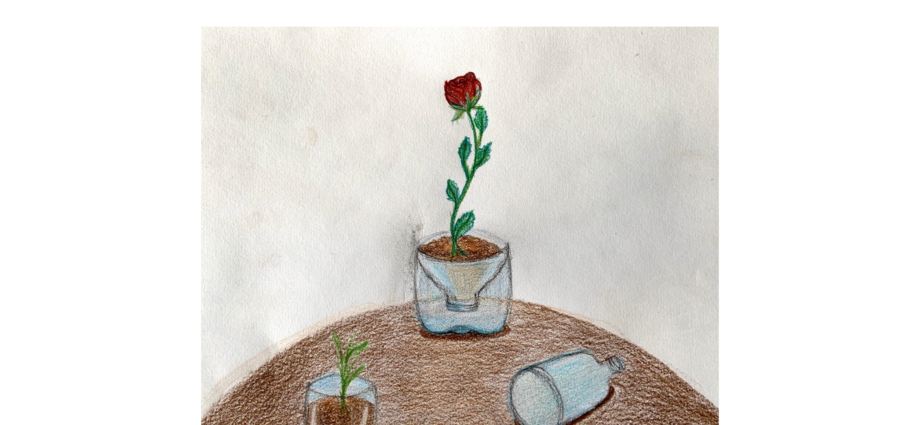By Lauren Griesedieck
Growing up, most of us have been told that we should recycle our plastic in order to help the environment. While we have been taught to reduce, reuse, and recycle, this type of thinking is not actually sustainable. In reality, it should be reduce and reuse, and then recycle, if absolutely needed. This is because most plastic cannot and will not be recycled.
In the past 40 years of recycling plastic, less than 10%1 of plastic has ever been recycled. In the US in the year 2018, 3,020,000 US tons of plastic was recycled, while 5,630,000 US tons were burned, and 27,030,000 US tons were sent to the landfills. Most plastic that is recycled is only soda bottles and milk jugs, but these items must not be contaminated. A contaminated item may contain food scraps or other substances, meaning that the plastic is not clean, and therefore, cannot be recycled. Cleaning contaminated plastic takes a lot of energy and resources, so many times, these are thrown in landfills. Most “recyclable” plastics are either landfilled, burned, or end up in the oceans. Why do we continue to do this if it isn’t sustainable? We do it because we have been taught to for years.
Plastic is made out of oil and gas. It is therefore no surprise that the oil, gas, and plastic industries were the spearheads of the campaigns promoting the recycling of plastic2. The issue of plastic started in the 1980s, when the public started to distrust and lean away from using plastic. At this time, plastic was very expensive to recycle, so recycling at this time included only glass, paper, and metal. Cities at this time, such as Minneapolis, were threatening to ban some plastic items since they could not be easily recycled. This prompted the oil, gas, and plastic industries to start promoting recycling programs so that their product could sell. Ronald Liesemer, a former DuPont manager, described that the attitude from the industries was “we’ll set this up and get it going, but if the public wants to continue to recycle, they will have to pay for it.3” However, their records show that top industry officials knew that recycling plastic could not be sustainable or feasible in the long run4. To keep their plastic product from getting banned, the promotion of recycling was a way to divert negative attention and profit off of their product, while letting the public believe that they were doing something positive. This advertising was very successful, Liesemer estimated that the favorability of plastic grew from the 30% range to around 65%5.
Single use plastic is very inexpensive to produce. But, most single use plastic cannot be recycled in normal recycling programs. Although there are recycling symbols at the bottom of some plastic items, it is not economical to recycle these products, and most curbside pick up programs do not want these products6. These items are left at recycling centers with the other items which cannot be recycled, like plastic food wraps, food containers, and clothes hangers from stores. Recycling centers then must pay more money to send this waste away. It is much cheaper for these centers and companies to send their waste to landfills than it is to ship it to a different recycling facility that can handle this plastic7.
In the past, about 45% of the world’s plastic waste was bought and shipped to China since 19928. However, only the “good items” were recycled. This meant that many of the hard-to-recycle plastic products were still sent to the landfill or burned. In 2018, China stopped taking imported plastic waste. Since then, countries like Indonesia and the Philippines are now buying some of these plastic scraps. But, it is impossible to know whether or not the plastic is being recycled properly, or if it is being disposed of like China previously did. Customs officials in Indonesia in 2019 found that around half of the containers of plastic that they inspected were contaminated with trash and plastics that cannot be recycled9. This contaminated plastic trash is just as big a problem for customs as narcotics coming into the country. Indonesia has been left with the same burden that China faced: how to deal with all of the plastic imports.
The reality of plastic recycling is far different than we were led to believe. This is all due to the oil, gas, and plastic industries, who spearheaded a misleading campaign about the sustainability of plastic recycling. This misleading campaign and the inability of Western countries to deal with their own waste has led to its export abroad. This plastic is still not fully recycled, and developing countries are now left to deal with the storage and disposal of this waste. This leads to a large environmental burden where plastic waste and microplastic drains into the water, air, and food. While this problem requires a widespread reform and ban of plastics, you can minimize your impact by prioritizing reducing and reusing before recycling. Most importantly, reduce the number of single-use plastics you use. Conscious consumption at the individual level is the least we could do for the preservation of our planet.
Note from the author
I have a recycling account on instagram (@recycliiing) where I share upcycling and recycling projects that I have done. Although many of my posts are about crochet and other yarn-based projects, my account also has tutorials on how to reuse items in your house, such as turning plastic bags into yarn and creating bowls out of old records. I’m planning on making a Youtube channel with more in-depth and different kinds of tutorials in the future. Feel free to send in your own projects or any ideas that you have!
Edited by Gunvir Paintal
Artwork by Doga Mehter
Notes
- https://www.epa.gov/facts-and-figures-about-materials-waste-and-recycling/plastics-material-specific-data
- https://www.npr.org/2020/03/31/822597631/plastic-wars-three-takeaways-from-the-fight-over-the-future-of-plastics
- https://www.youtube.com/watch?v=9jkUPahh7to&feature=emb_logo
- https://www.youtube.com/watch?v=9jkUPahh7to&feature=emb_logo
- https://www.youtube.com/watch?t=1273&v=-dk3NOEgX7o&feature=youtu.be
- https://www.youtube.com/watch?t=388&v=-dk3NOEgX7o&feature=youtu.be https://www.npr.org/2020/03/31/822597631/plastic-wars-three-takeaways-from-the-fight-over-the-future-of-plastics
- https://www.npr.org/transcripts/741283641
- https://www.npr.org/sections/goatsandsoda/2018/06/28/623972937/china-has-refused-to-recycle-the-wests-plastics-what-now
- https://www.youtube.com/watch?t=1583&v=-dk3NOEgX7o&feature=youtu.be

